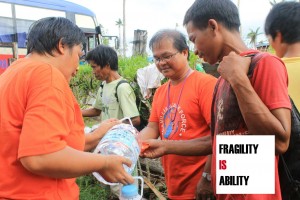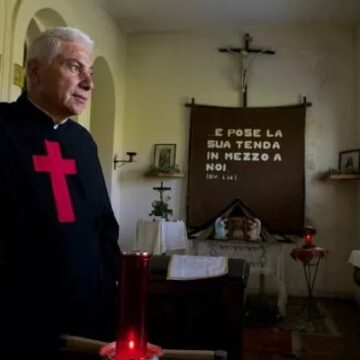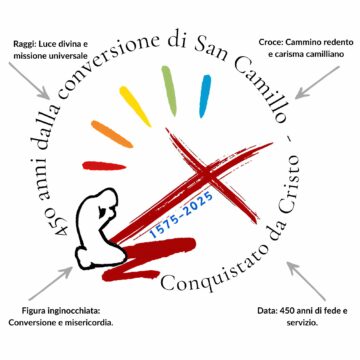The Third International Day for the Victims of Disasters
13 October 2014
For Camillian institutions

P.Mario Carli distribuisce alimenti e medicine agli ammalati di lebbra, Thailandia 1980. Foto di Guillermo Luna
To move out of institutional dynamics so as to cooperate with local communities ‘united in justice and in solidarity’
We here continue to reflect upon the subject of frailty, which was touched upon in the preceding article, this time addressing Camillian institutions.
Not being afraid of frailty can mean, for Camillian institutions, moving out of institutional dynamics which stop at the threshold of hospitals in their action and wanting to work with local communities ‘united in justice and in solidarity’.
‘Not being afraid of frailty’ as regards Camillian works, activities and projects means entering into harmony with the profound dimension of our own charismatic identity, which is well summarised in a strong passage – to the point of being almost caustic in the face of so many examples of our lukewarm approach – of Pope Francis in his Evangelii Gaudium: ‘A Church which “goes forth” is a Church whose doors are open. Going out to others in order to reach the fringes of humanity does not mean rushing out aimlessly into the world. Often it is better simply to slow down, to put aside our eagerness in order to see and listen to others, to stop rushing from one thing to another and to remain with someone who has faltered along the way. At times we have to be like the father of the prodigal son, who always keeps his door open so that when the son returns, he can readily pass through iy
Today and always, “the poor are the privileged recipients of the Gospel”, and the fact that it is freely preached to them is a sign of the kingdom that Jesus came to establish. We have to state, without mincing words, that “there is an inseparable bond between our faith and the poor”. May we never abandon them.
Let us go forth, then, let us go forth to offer everyone the life of Jesus Christ…I prefer a Church which is bruised, hurting and dirty because it has been out on the streets, rather than a Church which is unhealthy
from being confined and from clinging to its own security. I do not want a Church concerned with being at the centre and then ends by being caught up in a web of obsessions and procedures. If something should rightly disturb us and trouble our consciences, it is the fact that so many of our brothers and sisters are living without the strength, light and consolation born of friendship with Jesus Christ, without a community of faith to support them, without meaning and a goal in life. More than by fear of going astray, my hope is that we will be moved by the fear of remaining shut up within structures which give us a false sense of security, within rules which make us harsh judges, within habits which make us feel safe, while at our door people are starving and Jesus does not tire of saying to us: “Give them something to eat” (Mk 6:37).
To respond with our resources – and not only of an economic or material kind – to men and women who have been afflicted by disasters which rip up things, history and affections, means to be prepared to convert Camillian institutions in a profound way, institutions that will gradually cease to be institutional, in order to become more communional, less centred and more open, more ready to share – slowing down our pace – the uncertain steps of those who have lost all certainties; it means being more ready to live the immediacy of need and the gratuitousness of offering for those who are in front of us and can offer nothing in exchange.











